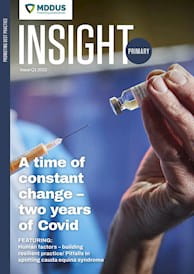These cases are based on actual calls made to MDDUS advisers and are published here to highlight common challenges within general practice. Details have been changed to maintain confidentiality.
Using reception staff as chaperones
Q. Our practice currently relies on nurses to act as chaperones during intimate examinations. Often this requires patients to re-book for a separate appointment. We would like to recruit some of our reception staff to act as chaperones. BMA guidance is not specific and only states that chaperones should be trained healthcare professionals. Can you advise?
The GMC provides guidance in relation to Intimate examinations and chaperones. It states (paragraph 9): “A chaperone should usually be a health professional and you must be satisfied that the chaperone will:
- be sensitive and respect the patient’s dignity and confidentiality
- reassure the patient if they show signs of distress or discomfort
- be familiar with the procedures involved in a routine intimate examination
- stay for the whole examination and be able to see what the doctor is doing, if practical
- be prepared to raise concerns if they are concerned about the doctor’s behaviour or actions.
Any staff member who undertakes a role as a chaperone should receive appropriate training. Provided you are satisfied that they are competent to fulfil the responsibilities of the role, there is no specific requirement that they be a clinical member of staff.
Staff pay equality
Q. I’m a practice manager and have been discussing with the partners their decision to offer staff a four per cent pay increase this year. It is recognised that currently we have marked inequality in pay across practice staff in similar or comparable roles. We would like to use this pay rise to help remedy this. Can we give a higher uplift to lower paid staff?
Most standard contracts of employment state that salaries will be reviewed annually but this does not automatically translate into a pay rise. Should the practice decide to offer a pay increase it would normally be at the partners’ discretion how much that rise would be and whether provided to all employees equally or based, for example, on other variables such as individual or team performance throughout the year. A greater percentage could be offered to staff on lower salaries to reduce pay inequality. However, it is important to ensure that you are able to justify your decisions if challenged and exercise caution that you do not disadvantage certain staff (e.g. part time workers).
Referral form
Q. A patient at the practice has been given a place at a local detox centre. The centre has asked that we complete and sign a detailed proforma. We think it would be more appropriate to send a patient summary (with consent) and then place the responsibility on the detox service to assess any risks. Do we have a duty of care to complete the form as provided?
GMC guidance on Delegation and referral states that when referring or delegating a patient’s care to another clinician, you should provide relevant information about the patient’s medical history. However, in doing so, the clinician should only provide information that is within their knowledge and expertise. This is in line with the GMC's Good medical practice, which states that you must “recognise and work within the limits of your competence”. Should the proforma ask for opinions outside of the expertise of the clinician completing the form, it would be advisable to defer opinion on that matter to the detox centre and consider providing a copy of relevant medical records with the patient’s consent. Certainly doctors have a duty to act in the best interests of patients and assist in ongoing medical needs but a GP would have no absolute obligation to complete the form as submitted.
Journalist asking for comment
Q. A journalist has contacted the practice asking for comment on criticism made by a patient on social media regarding how blood pressure monitoring is arranged at the surgery. We intend to reply that GDPR concerns would preclude discussing complaints from a particular patient but that we can explain our policy and procedures for blood pressure monitoring. Would this be a reasonable response?
Our usual advice to members is to be very cautious when responding to press requests for comment because of your duty of patient confidentiality. Any response beyond a brief generic reply could imply that the patient is registered at the practice, which may be seen as a confidentiality breach and could damage patient trust. Therefore we would suggest it would be preferable to say that you cannot comment due to your duty of confidentiality. GMC guidance on Confidentiality: Responding to criticism in the media states: “Disclosures of patient information without consent can undermine the public’s trust in the profession as well as your patient’s trust in you. Disputes between patients and doctors conducted in public can also prolong or intensify conflict and may undermine public confidence in the profession, even if they do not involve the disclosure of personal information without consent.” Consider contacting the patient directly and apologising for any distress that has been caused and invite them to raise their concerns via your complaints procedure.
Junior doctor smelling of alcohol
Q. A nurse has reported that a GPST in training at our practice was smelling of alcohol at work. What action should I take as practice manager?
Such accusations must obviously be taken seriously but it is important to adopt a fair and impartial approach. Your duty as a practice manager is to consider all concerns raised and act in the best interests of patients and staff to mitigate risks to safety. It would be sensible to consult with the practice partners and clarify with the nurse the circumstances of the allegation. The most appropriate person at the surgery (perhaps the clinical supervisor) should then speak to the trainee about the concerns. This should be approached in a sensitive way, exploring any underlying issues and to consider any support the trainee requires and actions the practice needs to take. You could also speak with the junior doctor’s educational supervisor and/or the training programme director who will have a duty of care to all of their trainees. Seek additional guidance from the General Medical Council: Raising and acting on concerns about patient safety.
Changes to the medical records of a transgender patient
Q. We are a small practice in the south of England and have a transgender patient. Can you provide advice on managing their NHS records?
A patient changing gender should be provided with a new NHS number from Primary Care Support England (PCSE) and will need to be re-registered as a new patient. PCSE will return the patient’s old notes to be incorporated into their new number. See guidance on the PCSE website (note that guidance will vary in Scotland, Wales and NI). For patients who have a Gender Recognition Certificate it is unlawful (under the Gender Recognition Act 2004) to disclose their previous gender without their consent and it is important that steps are taken to ensure personal data is protected. Information related to their previous identity (name, pronouns, etc) should be redacted from the notes, and any clinical information which is gender specific should only be retained (e.g. for safety and/or continuity of care) with the patient’s consent and after discussion explaining the importance of maintaining full clinical records and the risks of not doing so. The patient should be made aware that they will no longer be called for screening by national programmes and any appropriate screening will need to be arranged by the practice in agreement with the patient. See further information from MDDUS and relevant GMC guidance.
This page was correct at the time of publication. Any guidance is intended as general guidance for members only. If you are a member and need specific advice relating to your own circumstances, please contact one of our advisers.
Read more from this issue of Insight Primary

Save this article
Save this article to a list of favourite articles which members can access in their account.
Save to library
